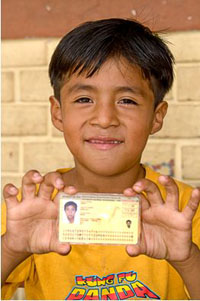- Español
- English

Universal Civil Identity Program in the Americas (PUICA)
- The Secretariat
- Electoral Cooperation and Observation
- Sustainable Democracy and Special Missions
- Effective Public Management
CIVIL IDENTITY
CIVIL REGISTRY
- About PUICA
- Mandates
- Civil Identity
- Lines of Action
- Projects
- Publications
- Work Team
Why is civil identity essential?

In 2011, according to UNICEF, 10 percent of children in Latin America and the Caribbean did not have a birth certificate. That one statistic does not tell the whole story, however. Ethnic groups suffer disproportionately compared to the population as a whole. Under-registration rates increase significantly in post conflict zones, even years after the cessation of hostilities. Under-registration is prevalent among children of single mothers, many of whom also lack documentation themselves. For the most part, people in rural areas are less like to possess civil identity than those living in urban areas; although high under-registration rates can be found in marginalized urban areas as citizens migrate to cities. A child without a birth certificate is less likely to receive an education and healthcare and more likely to be neglected or exploited.
While international instruments such as the Convention on the Rights of Child focus on the right of children to have a birth certificate, a name and a nationality, many adults do not possess sufficient documentation to exercise fully their most basic civil, political, economic, social and cultural rights. Statistics are difficult to quantify, but a working paper published by the Inter-American Development Bank notes that the rate of adult under-registration probably approaches that of the UNICEF figure for children between 0 and five years old. Problems with adult under-registration are multifaceted and can be attributed to economics, geography and public administration. Births may have been recorded, but many adults do not possess a copy of their birth certificate. In some cases they have a birth certificate with clerical errors that render the document useless. Many adults do not have a national identity card.
PUICA seeks to strengthen State institutions responsible for the legal recognition of persons, both to promote universal citizen identity and to ensure greater reliability of civil records. In this regard, it works closely with authorities to develop replicable methodologies to reach traditionally marginalized communities and to administratively and technologically strengthen civil registry institutions. PUICA projects help to provide birth certificates, issue national identity cards, correct erroneous information and reconstruct documentation destroyed by war or acts of nature
